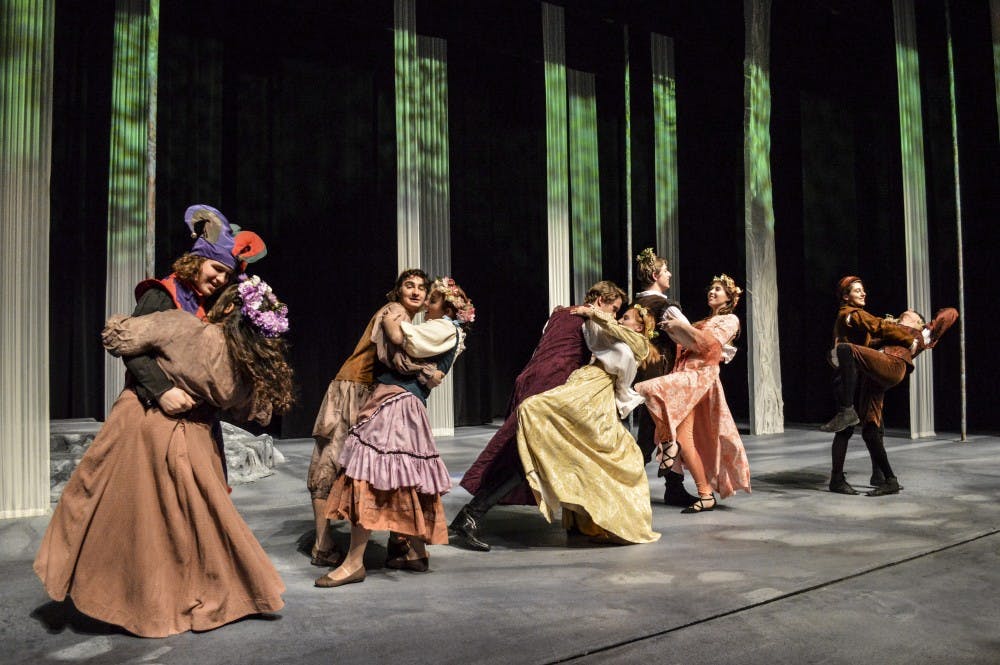The University of New Mexico theatre department opened its last show of the semester, “As You Like It,” last Thursday. The lighthearted play was brought to life by the hard work of the actors, along with the beautiful set and costumes that added even more vibrancy to the play’s atmosphere.
The play centers around Rosalind, a young noblewoman who is forced to flee from her uncle’s court when he fears that she is more loyal to her banished father than to him.
Accompanied by Touchstone, the court jester, and Celia, her cousin and dearest friend, she disguises herself as a man and takes refuge in the Forest of Arden. While she is there, she encounters Orlando, the young man that she fell in love with while she was still at court, who has been forced by his vengeful older brother to abandon his home and come to the forest.
Without the protection afforded by her status at court, Rosalind must find a way to form a meaningful relationship with the man that she loves, without revealing her true identity.
“As You Like It” is one of Shakespeare’s most upbeat plays, with a sense of optimism constantly present despite the difficult situations in which that the characters find themselves. Like his daughter, the banished duke, along with his loyal companions, is determined to make the best of life in the forest and never gives in to despair.
“It’s one of the happiest plays in the canon, and I think we need some happy right around now,” director Shepard Sobel said. “However, just one thin layer under the happy is a strong indictment of a power-hungry, hierarchal, jealous, vicious court, the only antidote for which is the accepting, generous, simple-pleasures society of the banished.”
In terms of characters, the most notable exception to the play’s optimistic attitude is Jaques, a traveler who seems determined to be unhappy with the rustic lifestyle of the forest, and in this sense provides a foil for most of the other characters.
This not only provides a different point of view about the forest, but also helps to enhance the play’s cheerful atmosphere through contrast.
Along with illustrating the benefits of a simple life, “As You Like It” also provides the opportunity to reflect on the effects of gender roles. Freed from the constraints of the court, Rosalind is able to use her disguise as a way to explore a different side of herself. She is no longer bound to society’s expectations of how a woman should behave, and much of her character growth involves the coming together of the masculine and feminine parts of her identity.
Similarly, once he is in the forest and away from the court, Orlando no longer feels that he has to prove his masculinity to his brother or to anyone else. As he interacts with Rosalind and the other characters that he meets in the forest, he begins to allow himself to let his guard down and appreciate the value of gentleness.
This commentary on gender roles feels very similar to the conversations being held today about the different expectations placed on men and women and the fluid nature of gender itself.
While Shakespeare obviously has a different view of gender than people today, “As You Like It” is a play that is surprisingly easy to fit into present-day discussions about the way that society’s perception of gender plays a large role in how individuals see themselves.
Get content from The Daily Lobo delivered to your inbox
“People aren’t purely masculine or feminine,” Christa Bell, the actress who plays Rosalind, said. “A man can be a lover and a woman can take charge. (“As You Like It”) throws out the idea that people have to stick to traditional roles and attitudes and instead, they can be themselves.”
Veronica Apodaca is a culture writer for the Daily Lobo. She can be contacted by email at culture@dailylobo.com or on Twitter @veeapodaca.






